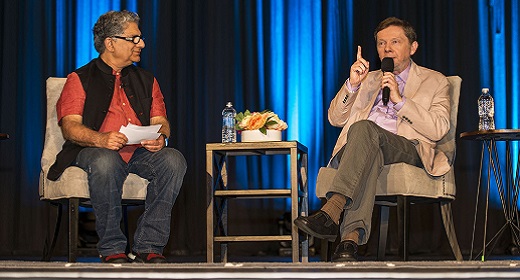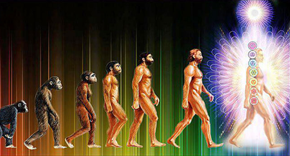by Deepak Chopra & Eckhart Tolle: As part of The Chopra Center’s “Seduction of Spirit” retreat at La Costa Resort & Spa…

in Carlsbad, Calif., on April 24, 2013, EckhartTolleTV hosted a live-streaming event called “A Conversation with Deepak Chopra and Eckhart Tolle.”
Who is Looking?
Following Tolle, Chopra took the stage and immediately picked up where he left off. “Right at this moment, as you are about to listen to me, just turn your attention to who is listening. You are looking at me. Turn your attention to who is looking. That is you. That has always existed,” he said to the audience.
That consciousness or “the one who is listening” has been with us all along, and is essentially timeless, he explained. “Time is just the movement of thought that creates a subject and object split. Transcendence is simply going beyond the subject object split – which is an artificial split, and the cause of every single problem that we know.”
Coming from the Vedanta tradition, known as Hindu philosophy, Chopra spoke of the five kleshas known as the cause of suffering. These are:
1. Not knowing who you are
2. The addiction and craving for permanence in a world that is inherently impermanent
3. The fear of impermanence
4.. Identifying with your self-image – all the labels, evaluations, judgments, ideas and concepts collected since birth – instead of your true self
5. The fear of death, which is also the fear of the unknown.
In the real world – the world of consciousness – there are not objects, said Chopra. Objects exist through perception. Another way of putting it is to say, “there are no nouns, only verbs,” he explained. “The universe is a verb. It’s an activity. It never stops.”
All suffering comes from nouns – or things – that don’t really exist, he told the audience. When looking at the five kleshas, or causes of suffering, all of them are contained in the first one – not knowing who we really are, which is essentially consciousness.
“You can’t find this presence by looking for it because it’s the one that is looking. You can’t find consciousness by looking for it because consciousness is the one that is looking,” Chopra explained.
Quoting Rumi, he said “who am I in the middle of all this though traffic.” He explained many of us identify with the traffic instead of the presence around it. We are always looking outside of ourselves for happiness – be it the right person, the right job, winning the lottery, perfect health – and all of this is thought.
“Before the thought arises you are already happy and after the though subsides you are exactly where you started from,” he noted. “Happiness or joy is the starting point, and it’s also the ending point.”
Chopra spoke about an acronym SIFT created by Dan Siegel, which stands for Sensation, Image, Feeling and Thought. These things occur within consciousness, but consciousness is always present with them.
“People ask where do I go when I die? Let me ask you a question,” he said to a person in the audience. “What did you have for lunch today?” The answer was a salad, and Chopra explained the memory came back to her through SIFT, an image, a feeling or a thought. “Where was that image before I asked you the question?”
He said traditional neuroscientists would say the image was in the brain, but they can’t answer where memory is stored at the cellular level. “Do you think if I went into your brain I could see that picture?” he asked the audience member. “So where do we go when we die? We go where the salad was before I asked you the question,” he joked. “We don’t go anywhere because we are there all the time.”
What we call the physical world – the one we experience with our five senses – is awareness within awareness, he said. If we could anchor ourselves in the “space” that Tolle spoke about prior, we can find a new and more joyful experience open to us.
“It’s your ticket to freedom,” said Chopra. “Why? Because it’s the you that never dies.”
Deepak’s Retreat
Chopra shared an experience he had at a retreat in Thailand two years ago in a monastery. Everyone there shaved their heads and eyebrows, went begging for food and shared one meal a day. The remainder of the time was spent in silence and “observing impermanence.”
“It had a dramatic effect on all of us because it threw us into presence,” he told the audience. “When we were leaving, the senior Abbott left us with two things, and I want to leave you with them.”
1.There are no boundaries in the universe. Every boundary is conceptual. In reality there are no boundaries. We create them, just like we create longitude and latitude for convenience.
2. The present moment is the only moment that never ends. Situations and circumstances around the present moment will change, but the moment won’t change because it’s timeless. It’s transcendent. It’s eternal.
“The most important moment of your life is now. The most important person in your life is the one you are with now, and the most important activity in your life is the one you are involved with now,” said Chopra. “If you do that, the unknown will become known to you. The unknown is actually known only in the present moment. Death happens only in time. Only that which is born dies; that which is never born cannot die.”









































